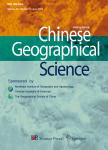Urban China in Transformation:Hybrid Economy,Juxtaposed Space,and New Testing Ground for Geographical Enquiries
Urban China in Transformation:Hybrid Economy,Juxtaposed Space,and New Testing Ground for Geographical Enquiries作者机构:Department of Geography University of Hong Kong
出 版 物:《Chinese Geographical Science》 (中国地理科学(英文版))
年 卷 期:2011年第21卷第1期
页 面:1-16页
核心收录:
学科分类:0303[法学-社会学] 12[管理学] 1204[管理学-公共管理] 0708[理学-地球物理学] 0705[理学-地理学] 0813[工学-建筑学] 0704[理学-天文学] 0833[工学-城乡规划学]
基 金:Under the auspices of the Research Grants Council of the Hong Kong Special Administrative Region, China (No. GRF HKU-747509H) Mrs. Li Ka Shing Fund for Contemporary China Studies Strategic Research Theme (No. HKU-20388025) the Small Project Funding of the University of Hong Kong (No. HKU-10400706)
主 题:中国模式 城市转型 城市经济 城市空间 试验场 查询 地理 城市居住区
摘 要:History has brought us into a significant moment when the majority of the human kind has taken up resi-dence in urban settlements. The focus of global urbanization has shifted to the developing world and the center of manufacturing is no longer confined to the Global North. This paper provides a periodical assessment of the current status of China s urban transformation in the global context of a shifting emphasis of industrialization and urbaniza-tion. China s phenomenal urban transformation deserves a special attention not only because of its unparalleled scale and speed but also because of its distinct trajectory of growth that does not conform to normal theoretical ex-pectations. The results of assessment revealed an urban economy with remarkable hybridity, a society that is in-creasingly stratified, polarized, and segregated, and a juxtaposed urban space undergoing restless and pervasive transformation. A decentering world should entail a decentering knowledge production. A critical reflection upon the Chinese patterns and processes of urban transformation has identified 4 main issues with great potentials for inno-vative knowledge production, namely: 1) privatization and economic development; 2) state, society, and space; 3) urbanization of capital, labor, and land; and 4) the environment and Chinese political ecology. The paper closes with the remark that a rapidly transforming urban China has presented itself as a fertile and resourceful testing ground for critical and innovative geographic enquiries.



